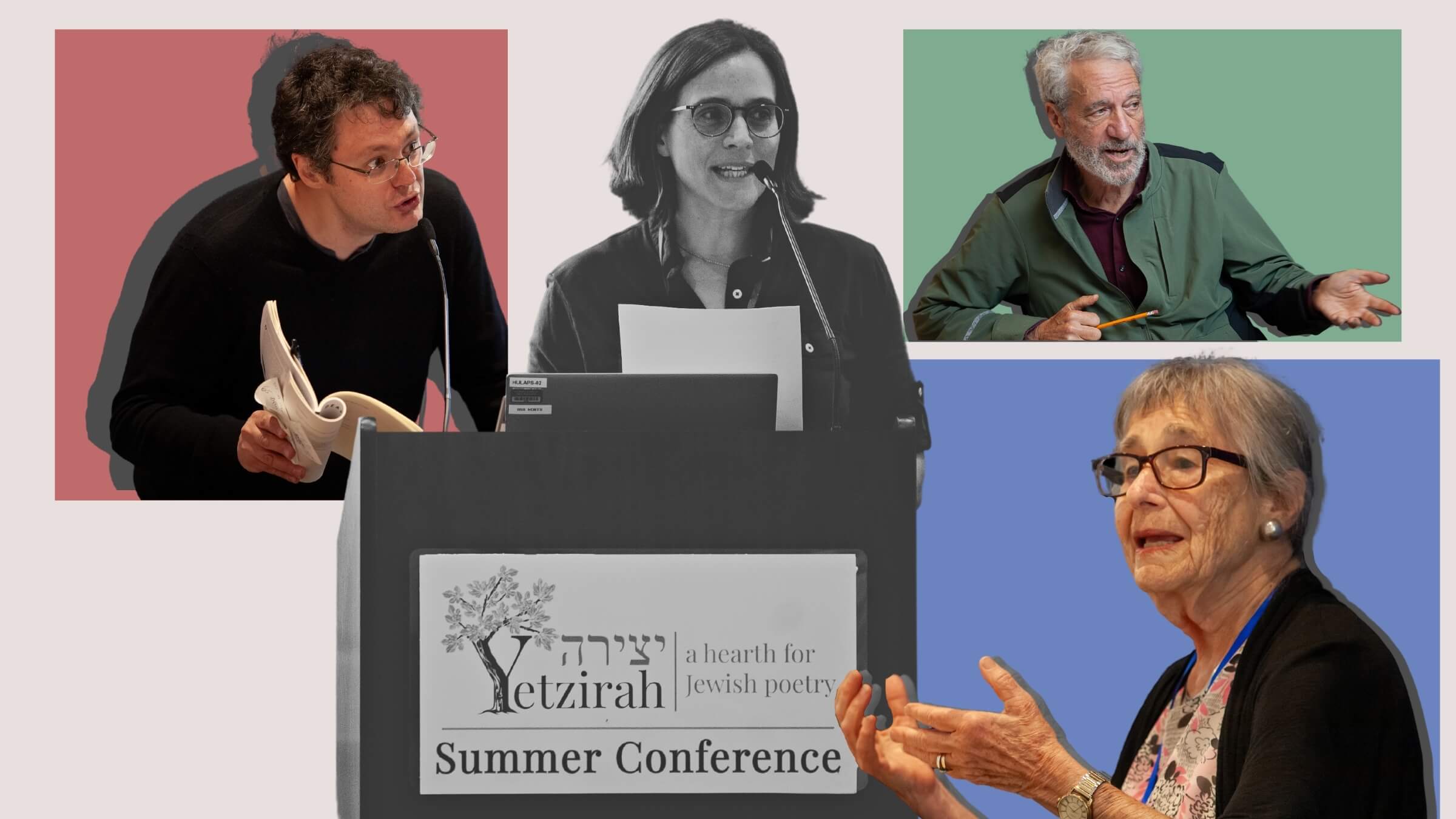Something wonderful is happening in the world of Jewish poetry
At the Yetzirah Poetry Conference, some Jewish poets feel they have finally found their very own shul

Clockwise from top left: Ilya Kaminsky, Yetzirah founder Jessica Jacobs, Rodger Kamenetz and Alicia Ostriker. Photo-illustration by Matthew Litman. Photos by Cory Weller.
More than 50 Jewish poets gathered earlier this summer for the first-ever Yetzirah Poetry Conference, part of a new initiative to create a “hearth” for Jewish poetry. Over the past few months, hundreds of people have attended Yetzirah poetry readings via Zoom and tuned in to public programming about Jewish poetry online.
All of this has contributed to a growing feeling in the literary community that something wonderful is happening in Jewish poetry.
Yetzirah calls itself “the first national nonprofit literary organization dedicated to fostering and supporting a community space for Jewish poets, nourishing writers and readers of Jewish poetry now and for generations to come.”
The organization is the brainchild of poet Jessica Jacobs, and it grew out of her own experience writing her forthcoming collection Unalone and seeking community.
“In 2017, I began working on a collection of poems in conversation with Genesis and related Midrash,” Jacobs told me. “Having lived a largely secular life up to that point, it quickly became clear how this study and writing was changing the way I understood the world. While poetry had led me back to Judaism, Judaism in turn deepened my poetry.
“So I went in search of other Jewish poets with whom to discuss this — and was surprised at how hard they were to find.”
“Figuring I wasn’t the only one who felt this way,” Jacobs added, “I founded Yetzirah to provide a community for Jewish poets in which they could find companionship and support and, as both Jews and poets, a space in which they could more fully integrate those often disparate-seeming parts of their identity.”
Bringing poetry and Judaism together
The inaugural Yetzirah conference, in Asheville, North Carolina, featured legends in the world of Jewish poetry including Alicia Ostriker, Jacqueline Osherow, Rodger Kamenetz and Ilya Kaminsky, along with 36 other accomplished poets.
Asheville’s mayor — Esther Manheimer, who happens to be both Jewish and a reader of poetry — offered official greetings to all the poets. [Author’s note: I also attended, and gave a talk and a reading.]
Along with public readings and panels on such topics as “Writing Contemporary Midrash,” much of the agenda was private, open only to poets accepted to the conference.
Osherow led a workshop focused on the Psalms; Kamenetz focused on dreamwork; Kaminsky discussed addressing big questions and using images.
For many poets, the conference was an emotional experience, one that united their writing lives and the Jewish lives. Many spoke of feeling that their writing lives and Jewish lives were separate, and here they at last found a way to put writing and Judaism together. The conference was diverse in many ways, including Jewish practice — it included everyone from Reconstructionist to ultra-Orthodox Jews.
There was one pulpit rabbi in attendance — Rabbi Mark Elber of Temple Beth El in Falls River, Massachusetts, and a poet, naturally, as well as the author of The Everything Kabbalah Book.
A place for Jewish poetry
Yetzirah offers a “place in which I can feel whole — or closer to whole as a poet and a Jew,” said Rick Chess, a poet and board member who previously directed the University of North Carolina-Asheville’s Center for Jewish Studies. “Jewish poetry has been a deep, integral part of my Jewish life since my early 20s when I began my adult engagement with Jewishness and Judaism. How wonderful to have a community, now, of others for whom poetry and Jewish life is intertwined, maybe even integrated.”
On Shabbat, there were services and a communal dinner. Some participated in a walking tour of Jewish Asheville, where a highlight was seeing the house of the writer Thomas Wolfe, whose mother owned a boarding house and had Jewish neighbors. For some, there was a Kiddush lunch that featured shoo-fly pie.
Immersion in Jewish poetry was a hallmark of the event. Genderqueer Jewish poet Ava Winter gave a beautiful reading focusing on gender and Jewish text and practice, Sarah Sassoon read and spoke about her Iraqi Jewish heritage, and Osherow brought down the house with a rousing reading of the opening poem in her latest collection, Divine Ratios.
Many attendees said they felt that here, they had finally found their shul.
“As Alicia Ostriker, our keynote speaker, was leaving the conference, she said that at long last she felt she’d found her congregation,” Jessica Jacobs told me. “I felt the same way and saw this shared joy in the faces around me.”
A message from our CEO & publisher Rachel Fishman Feddersen
I hope you appreciated this article. Before you go, I’d like to ask you to please support the Forward’s award-winning, nonprofit journalism during this critical time.
We’ve set a goal to raise $260,000 by December 31. That’s an ambitious goal, but one that will give us the resources we need to invest in the high quality news, opinion, analysis and cultural coverage that isn’t available anywhere else.
If you feel inspired to make an impact, now is the time to give something back. Join us as a member at your most generous level.
— Rachel Fishman Feddersen, Publisher and CEO